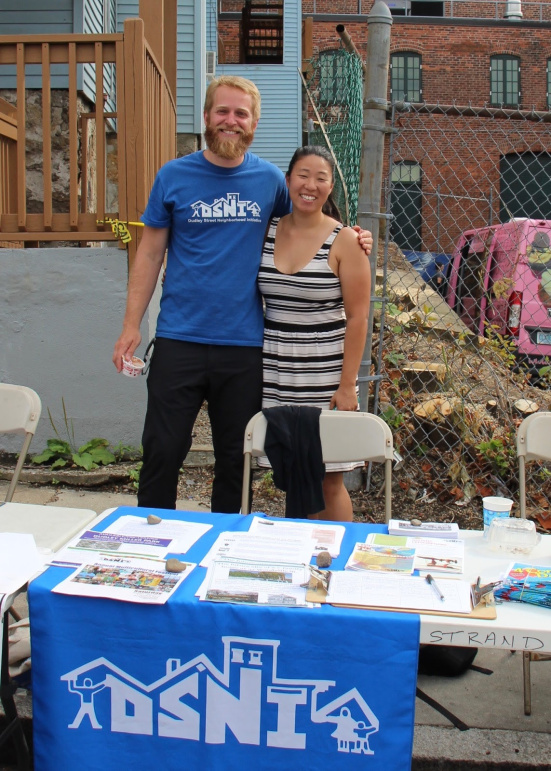Each summer, two Tufts UEP graduate students work with community partners for a 10-week fellowship through the CoRE (Co-learning/Co-education) partnership. Funded by Tisch College, fellows get hands-on experience in community planning, organizing and development while helping to extend the collaborative work between the Tufts and the community partner. Below, Sharon Cho reflects on her summer with the Dudley Street Neighborhood Initiative. Click here for our previous post on Minnie McMahon’s experience with Neighbor to Neighbor Massachusetts.

Ben Baldwin (UEP 2016) and Sharon Cho tabling in Dorchester
I had the opportunity to spend this summer as a Tisch fellow at the Dudley Street Neighborhood Initiative (DSNI), a community-based nonprofit organization located in the Roxbury neighborhood of Boston. I primarily worked with the Dudley Neighbors Inc. (DNI) team, which stewards the neighborhood’s community land trust (CLT).
At UEP, I have focused on community-controlled development and my work with community land trusts had been somewhat limited to the world of academia. For justice-minded academics and activists, CLTs are often lifted up as the most virtuous model of housing affordability and tool to fight displacement.
Yet we seldom hear about what it takes to run a land trust. How does a land trusts balance efforts to ensure organizational and financial sustainability with its mission to empower the community and support neighborhood stabilization? What happens when the homeowner you are reaching out to about a community event is also behind in their ground lease payments? How does a land trust navigate the tensions that arise when acting as both a place-based planning organization and a “landlord”?
With DSNI and DNI, I had the opportunity to see first-hand how to operate a CLT project. My main summer work — finalizing the DNI Policy and Procedures Manual — was built on the work of my two predecessors (Ben Baldwin 2015 and Gabo Sub 2016). The manual documents and formalizes DNI’s operating procedures, to ensure that organizational practices become institutionalized over the years even with staff changes. It covers a breadth of topics including how to determine eligibility for CLT homeownership, addressing violations of the ground lease, managing resales, and board governance. Moreover, DNI’s manual may serve as an operations template for emergent land trusts seeking resources and guidance from more established land trusts.
In addition to completing the operations manual, I supported DNI’s Project Manager, Ben Baldwin (UEP ‘16), in a variety of day-to-day operations tasks such as preparing and mailing monthly ground lease invoices and addressing DNI homeowners’ requests to remedy structural issues on DNI land. I additionally provided as-need support to DSNI in its community outreach efforts for its two of its major annual events.
Working at DNI brought to reality the many challenges and contradictions that community land trusts must learn to negotiate. However, my greatest takeaway from DNI was not the realization that the community land trust is an imperfect model: what became clear is that despite the obstacles and shortcomings, CLTs are a profoundly powerful tool to empower communities and stabilize neighborhoods because they are founded on the principle to value people over profit.
I feel deeply grateful to have had the privilege to work alongside DSNI’s talented and dedicated staff, and to have contributed to and learned from an organization with such an extraordinary history of grassroots planning and organizing. Working for DNI gave me a glimpse into the messy yet important work of running a land trust and I leave feeling inspired by the many people who are committed to growing the land trust movement.
